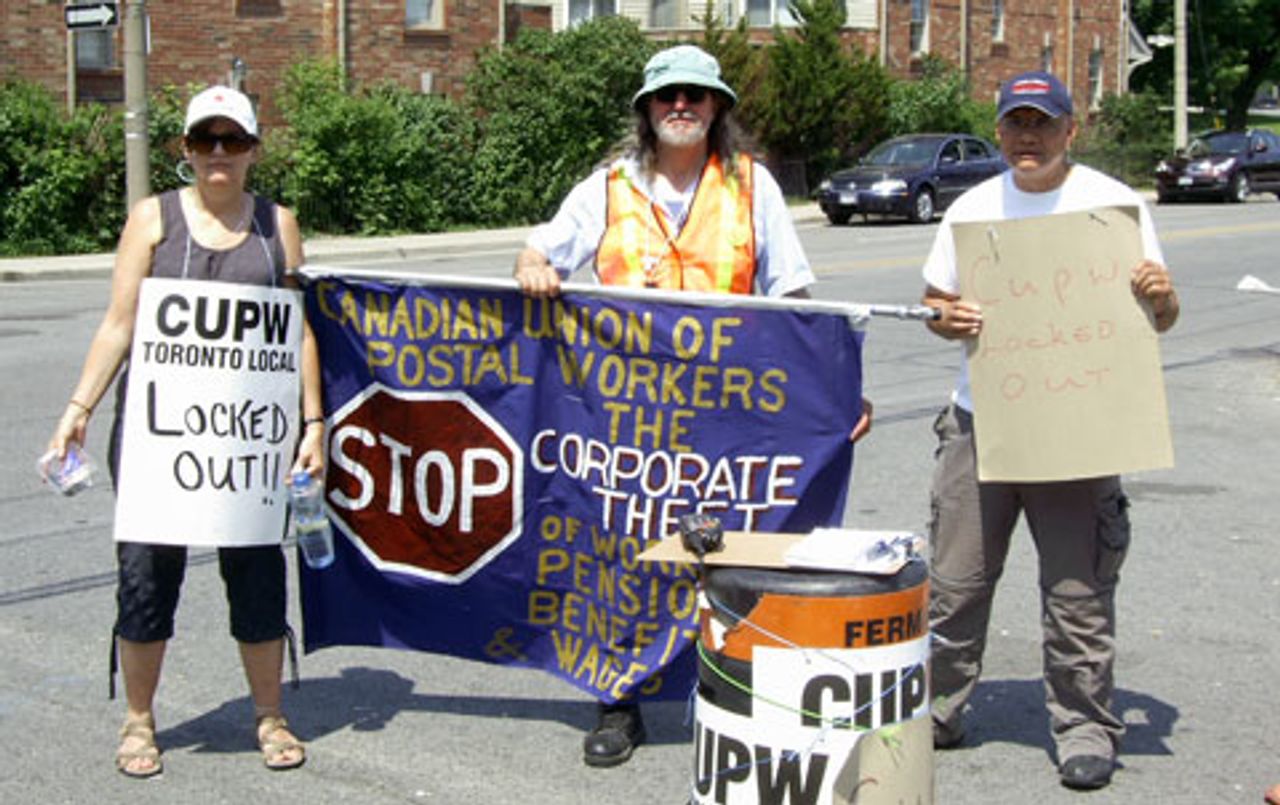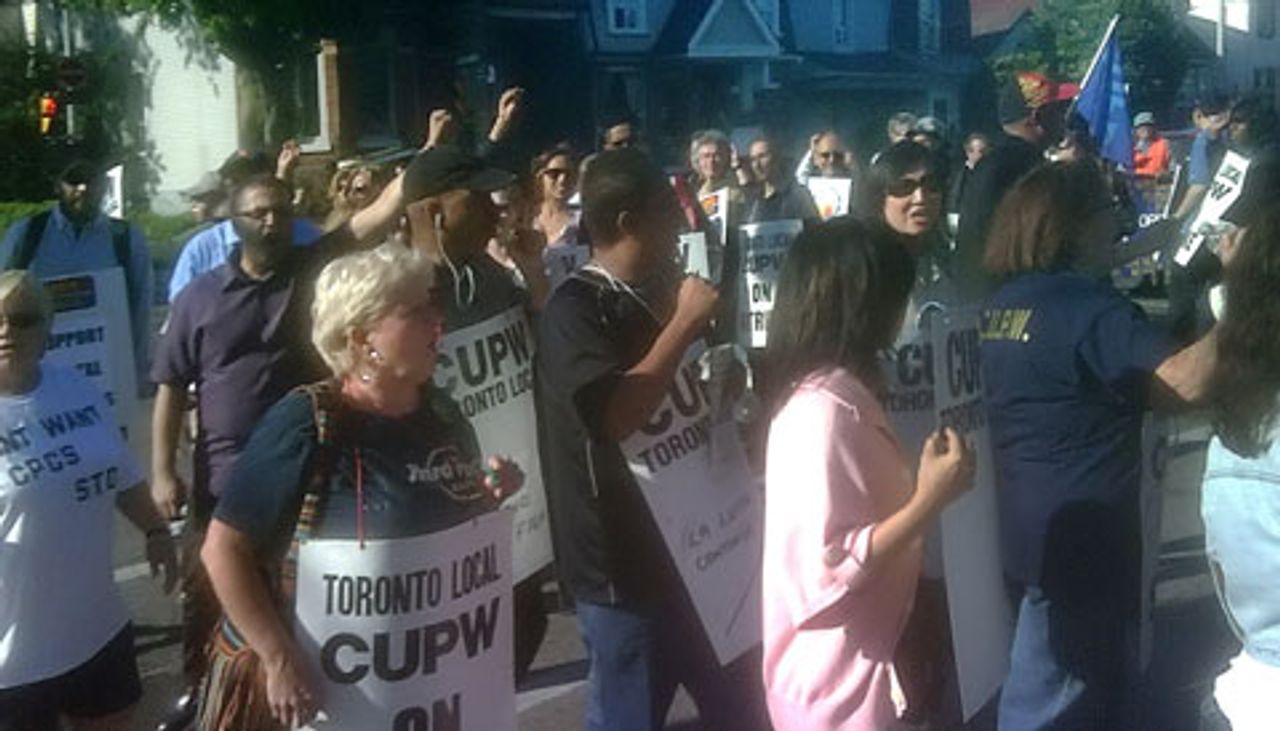Canada’s Conservative government is mounting a multi-pronged attack on the working class with the aim of bolstering big business’ drive to slash wages, jobs, and benefits and breaking all resistance to the dismantling of vital public services.
 Locked out postal workers at Toronto's south central sorting station
Locked out postal workers at Toronto's south central sorting stationLate Tuesday night, federal government-owned Canada Post imposed a nationwide lockout against 48,000 mail-sorters, letter-carriers, mail truck drivers, and postal station clerks. It sought to justify this provocation by claiming that an anemic campaign of localized 24-hour rotating walkouts mounted by the Canadian Union of Postal Workers (CUPW) since June 3 was costing the company tens of millions of dollars.
The Conservative government lost no time in using the lockout as a pretext to directly intervene in the dispute at Canada Post—a dispute that has been provoked by the post office’s demands for sweeping contract concessions, including a two-tier pay and benefit structure and a new hazardous and job-cutting work regime for letter carriers . On Tuesday afternoon, the government announced that before the day was out it would formally initiate the 48-hour process to introduce an emergency back-to-work law, illegalizing all job action by postal workers and suspending their collective bargaining rights.
The announcement came some 24 hours after the Conservatives said that they would adopt a similar strikebreaking law against 3,800 Air Canada customer service agents and call center workers. The Air Canada workers had walked off the job at midnight Tuesday to oppose the demands of Canada’s largest air carrier for massive cuts in pensions for future retirees and the scrapping of a defined-pension benefit plan for new hires.
Speaking in Canada’s Parliament Wednesday, Conservative Prime Minister Stephen Harper defended the government’s attack on the postal and Air Canada workers, saying that the labor unrest was “threatening to jeopardize economic recovery.” This is entirely in keeping with drive of the newly-elected Conservative majority government to place the full burden of the capitalist crisis on working people. In the name of fostering “economic recovery,” the Conservatives have pledged to further slash corporate taxes, gut environmental and health and safety regulations, and balance the federal budget through a more than 10 percent cut in federal discretionary per capita spending and by hiking user fees for government services.
 Tuesday evening rally at Toronto's south-central sorting station
Tuesday evening rally at Toronto's south-central sorting stationThe imposition of a nation-wide lockout without any prior notice to the Canadian public is only the latest in a long series of provocative acts by Canada Post management. Last week the company suspended the expired collective agreement, stripping injured and sick workers of their benefits, and announced the imposition of a partial lockout this week, including a three-day workweek for letter carriers. The partial lockout has now been superseded by the full lockout implemented late Tuesday.
In defending this escalation, Canada Post claimed the rolling localized walkouts were imperilling the Crown corporation’s future. Said company spokesman Jon Hamilton, the dispute “is having a huge impact on the business … If we allow the uncertainty created by the rotating strikes to continue—and we've seen customers walking away from Canada Post—our ability to remain financially self-sufficient and not become a burden on taxpayers certainly is going to be in jeopardy."
The union has disputed the hefty loss figures provided by Canada Post and has produced photographs taken inside postal sorting stations across the country showing large mail volumes that suggest the public was continuing to use the postal service.
Throughout the dispute, the union officialdom has stood the traditional idea of industrial action on its head, regularly bragging that its rotating strike strategy has had a minimal impact on national postal service. “While I agree that rotating strikes slow the mail down, we certainly weren’t slowing it down a lot,” said John Deveau, CUPW’s National Director for the Ontario region.
If the union strategy has been to mount an ineffectual job action, it is because its overriding concern and that of the Canadian Labour Congress has been to avoid an all-out confrontation with the government of Conservative Prime Minister Stephen Harper and this for two reasons. The union bureaucracy hopes to maintain its privileges, at the expense of rank-and-file workers, by accommodating itself to Canada’s new right wing majority government, just as the unions have integrated themselves ever more closely into management over the past quarter century. The unions fear that a challenge to the government and its big business agenda could precipitate a movement of the working class that would rapidly escape their control and threaten the entire social-political order.
Even before the government announced its intention to illegalize the postal workers’ strike , Labour Minister Lisa Raitt solidarized herself with Canada Post management, parroting its explanations for why a lockout had to be imposed. “If Canada Post,” said Raitt, “is losing that much revenue and money and they are worried about market share, I will have to talk to my colleagues” about the possibility of ordering postal workers back on the job.
The government’s decision to use a strikebreaking law against the postal workers came as no surprise to CUPW officials. After all, one of their principal justifications for limiting job action was to deny the government a “pretext” to intervene against the postal workers. The predictable result of this bankrupt strategy has been to encourage Canada Post and the government to take the offensive.
In response to Canada Post’s lockout announcement, CUPW Ontario Director Stan Deveau was forced to warn, "I see (the lockout) as a manoeuvre on the part of the corporation to try and get the government to legislate us back to work and legislate some type of unfavourable collective agreement on to us, as opposed to allowing the free and collective bargaining process to work itself out."
Nor was the trade union-supported New Democratic Party, Canada’s newly-minted Official Opposition, surprised by the government’s attack on the postal workers. Speaking shortly after Raitt announced the impending back-to-work legislation against the postal workers, NDP leader Jack Layton declared, “I think they were prepared to shut this process down right from the get go. I don't think the government has been serious about urging the sides to come together to get a resolution.”
Yet till yesterday the NDP had maintained a studious silence about the postal workers’ struggle, failing to issue even a pro forma statement of support.
For its part, the Canadian Labour Congress quietly waited until the events of Tuesday and Wednesday to make their first pronouncements on the two national strikes—meekly calling on citizens to boycott Canada Post and Air Canada and to write to their respective CEOs!
In the wake of the lockout announcement, CUPW President Denis Lemelin held a press conference Wednesday morning to implore Canada Post president Deepak Chopra to instruct his negotiators to change their intransigent stance and to allow CUPW volunteers to deliver social assistance cheques due next week. With Harper’s anti-strike legislation looming, Lemelin refused to offer any guidance to his membership. “It has not yet happened so we can’t address that now,” he said.
Instead, the CUPW president repeated his proposal of last week to call off all job action if Canada Post will only agree to reinstate the medical and dental benefits for union members and their families that were cancelled last week.
Lemelin’s slavish appeal to Chopra echoed the response of Canadian Auto Workers President (CAW) Ken Lewenza the previous day. Responding to the government’s move to illegalize the Air Canada strike only hours after it had begun, Lewenza announced that the CAW is determined to strike a deal with Air Canada in the next 48 hours—that is under conditions where Air Canada–like Canada Post—has the government’s threat of a back-to-work law to further browbeat and intimidate its employees.
If postal and Air Canada workers are not to suffer yet another bitter reversal, they must seize the leadership of their anti-concessions struggle from the union bureaucrats. Through the development of rank-and-file committees, organized outside and in opposition to the union apparatus, they must prepare defiance of the Harper government’s strikebreaking legislation and make their strikes the spearhead of a working-class political and industrial offensive against all job and wage cuts and in defense of worker rights and public services.
Subscribe to the IWA-RFC Newsletter
Get email updates on workers’ struggles and a global perspective from the International Workers Alliance of Rank-and-File Committees.
